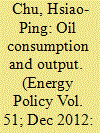| Srl | Item |
| 1 |
ID:
115176


|
|
|
|
|
| Publication |
2012.
|
| Summary/Abstract |
This study applies bootstrap panel Granger causality to test whether energy consumption promotes economic growth using data from G-6 countries over the period of 1971-2010. Both nuclear and oil consumption data are used in this study. Regarding the nuclear consumption-economic growth nexus, nuclear consumption causes economic growth in Japan, the UK, and the US; economic growth causes nuclear consumption in the US; nuclear consumption and economic growth show no causal relation in Canada, France and Germany. Regarding oil consumption-economic growth nexus, we find that there is one-way causality from economic growth to oil consumption only in the US, and that oil consumption does not Granger cause economic growth in G-6 countries except Germany and Japan. Our results have important policy implications for the G-6 countries within the context of economic development.
|
|
|
|
|
|
|
|
|
|
|
|
|
|
|
|
| 2 |
ID:
117007


|
|
|
|
|
| Publication |
2012.
|
| Summary/Abstract |
This study examines the growth, conservation, neutrality and feedback hypotheses for 49 countries during the period from 1970 to 2010 using panel causality analysis: this technique accounts for both dependence and heterogeneity across the countries. The results provide evidence as to the direction of causality between oil consumption and output and are consistent with the neutrality hypothesis for 24 countries, the growth hypothesis for 5 countries, the conservation hypothesis for 13 countries, and the feedback hypothesis for 7 countries. The findings provide important policy implications for the 49 countries under study.
|
|
|
|
|
|
|
|
|
|
|
|
|
|
|
|